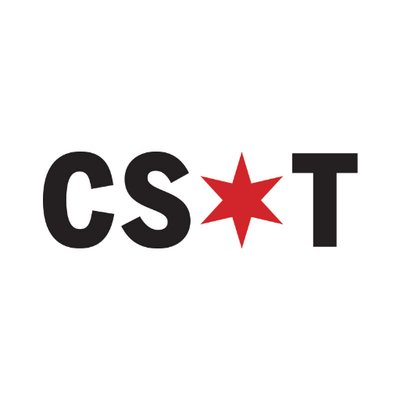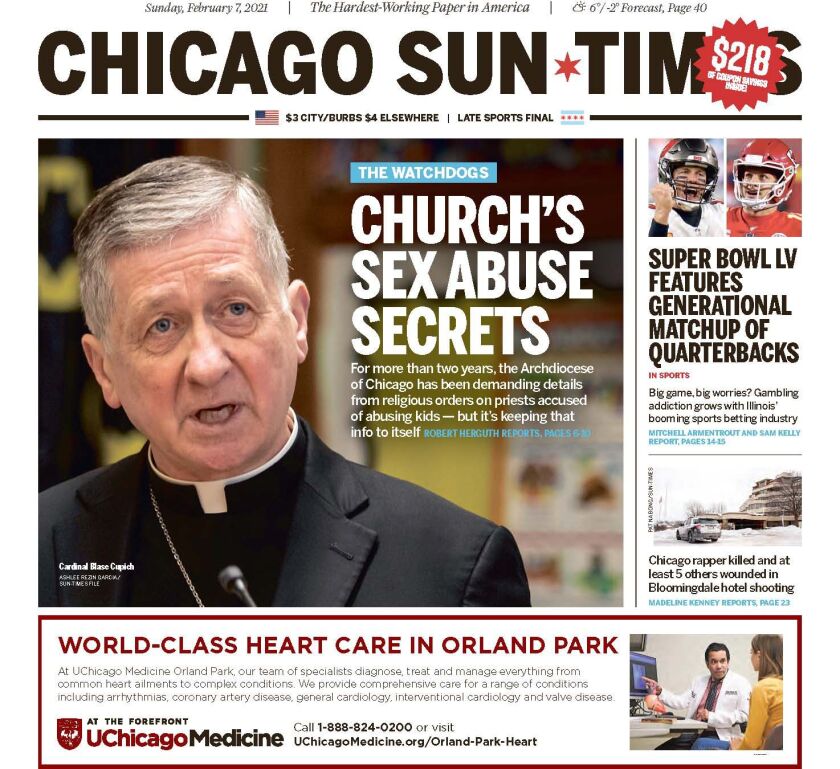



In August 2018, shortly after then-Illinois Attorney General Lisa Madigan announced an investigation into whether the Catholic church in Illinois had fully disclosed the scope of child sex abuse by priests and other clergy members, Cardinal Blase Cupich said the church had nothing to hide.
“Our record’s clean,” the top Catholic cleric in Chicago told a closed-door gathering of about 200 men studying at the Mundelein seminary to be priests, according to sources who were there. “I’m confident that, when the attorney general looks in our files . . . that she will, in fact, find that we’re doing our job.”
“We posted all of the names,” Cupich told the group, referring to the publicly available church list of clergy members in the Archdiocese of Chicago deemed to have been credibly accused of sexual abuse.
Cupich’s assertions were far off the mark, according to the results of the investigation announced Tuesday by Madigan’s successor, Kwame Raoul, who said the archdiocese, covering Cook and Lake counties, and the rest of the Catholic church in Illinois failed to acknowledge hundreds of allegedly abusive priests and other religious figures.
“Before this investigation, the Catholic dioceses of Illinois publicly listed only 103 substantiated child sex abusers,” Raoul wrote in a 696-page report detailing the findings. “By comparison, this report reveals names and detailed information of 451 Catholic clerics and religious brothers who abused at least 1,997 children across all of the dioceses of Illinois.”
His office determined that after reviewing more than 100,000 pages of records from the six main arms of the church in Illinois: the Chicago archdiocese, the dioceses of Joliet and Rockford that cover the collar counties and three other dioceses covering downstate.
Raoul said his agency — the state government’s legal representative as well as being a consumer advocate — fielded more than 600 “confidential contacts from survivors” during the investigation. The report chronicles some of their stories.
Some of the abusive clergy already had been known to church authorities, others apparently weren’t and came to light from the investigation.
“Decades of Catholic leadership decisions and policies have allowed known child sex abusers to hide, often in plain sight,” Raoul wrote. “And because the statute of limitations has frequently expired, many survivors of child sexual abuse at the hands of Catholic clerics will never see justice in a legal sense.
“It is my hope that his report will shine light both on those who violated their positions of power and trust to abuse innocent children, and on the men in church leadership who covered up that abuse.”
Raoul said that, by naming the offenders in his report, “The intention is to provide a public accountability and a measure of healing to survivors who have long suffered in silence.”
Cupich’s aides didn’t immediately return emails seeking comment.
A goal of the Illinois investigation — which was spurred by the 2018 findings of a grand jury investigation in Pennsylvania that found more than 300 Catholic clergy members there had molested more than 1,000 kids over the preceding decades — was to “obtain a complete accounting of substantiated child sex abuse committed by Illinois Catholic clerics.”
Shortly after that finding was made public, Cupich told the seminarians, “We are not what happened in the grand jury in Pennsylvania.”
Yet Raoul’s agency found that the numbers of abusers and victims in the Catholic church in Illinois are “far greater than those reported by the Pennsylvania grand jury.”

Cardinal Blase Cupich is now including members of Catholic religious orders in the Archdiocese of Chicago’s online list of clerics deemed to have been credibly accused of child sex abuse. But there are omissions and inconsistencies in what’s been added.
Ashlee Rezin / Sun-Times file
Nationally, the clergy sex abuse scandal first came to light in the 1980s, and it has unfolded in waves since then, with additional accusations of child rape by priests and revelations of repeated coverups by the church hierarchy.
Raoul reserved some of the harshest language in his report for the Joliet diocese, which includes DuPage and Will counties.
“In the context of all Illinois dioceses, the Diocese of Joliet has been ahead of the curve in installing policies and procedures to respond to and prevent clerical child sex abuse,” the report said. “Even so, the diocese has demonstrated slavish adherence to off-the-books, unwritten policies that derail justice for abuse survivors and much-needed institutional transparency.”
Raoul pointed to changes in church practices because of his agency’s investigation, including more public accounting.
When the inquiry was launched under Madigan, just two of the six dioceses in Illinois maintained a publicly available list of predator priests: the Chicago archdiocese and the Joliet diocese. And those lists were riddled with omissions.
Now, all six of the Illinois dioceses have made public the names of clergy members they have deemed to be credibly accused of sexual abuse.
Victims and victims’ advocates say such disclosures can help with healing by providing an acknowledgement of their suffering and naming their assailants.
The archdiocese has “changed its policy,” according to Raoul, to no longer ignore accusations against clergy who have since died and now reviews “new allegations against deceased clerics.”
Spurred by the investigation and following a series of Chicago Sun-Times reports over the past several years, Cupich also has begun listing some but not all sexually abusive clergy from independently run religious orders, such as the Carmelites, Claretians, Dominicans, Franciscans and Jesuits, who have served in his territory.
While many clergy working in a diocese report to the local bishop and are tethered to that specific geographic region, orders often operate across multiple dioceses and even states. They typically follow the teachings of a particular saint and focus on a specialized ministry, such as education or healthcare.
The Sun-Times has reported that even with the increased transparency, the Chicago archdiocese has still failed to publicly acknowledge many child molesters from those religious orders, which staff many Chicago-area high schools.
And Raoul’s investigation found the church is still slow to embrace full disclosure, with 160 abusers “not disclosed” on diocesan websites at the time the inquiry wrapped up.
“More work remains,” Raoul said.
Whether that will include any criminal prosecutions is unclear. In other states where an attorney general has launched a similar investigation, that has resulted on occasion in charges being filed.
Other states also have changed laws that extend the statute of limitations to give clergy sex abuse victims a new window of time to file lawsuits.
It’s unclear whether that’s a possibility in Illinois or might happen. Raoul’s report noted that’d likely take an amendment to the Illinois constitution.
READ MORE

Click here to read Sun-Times Feb. 7, 2021, report.
